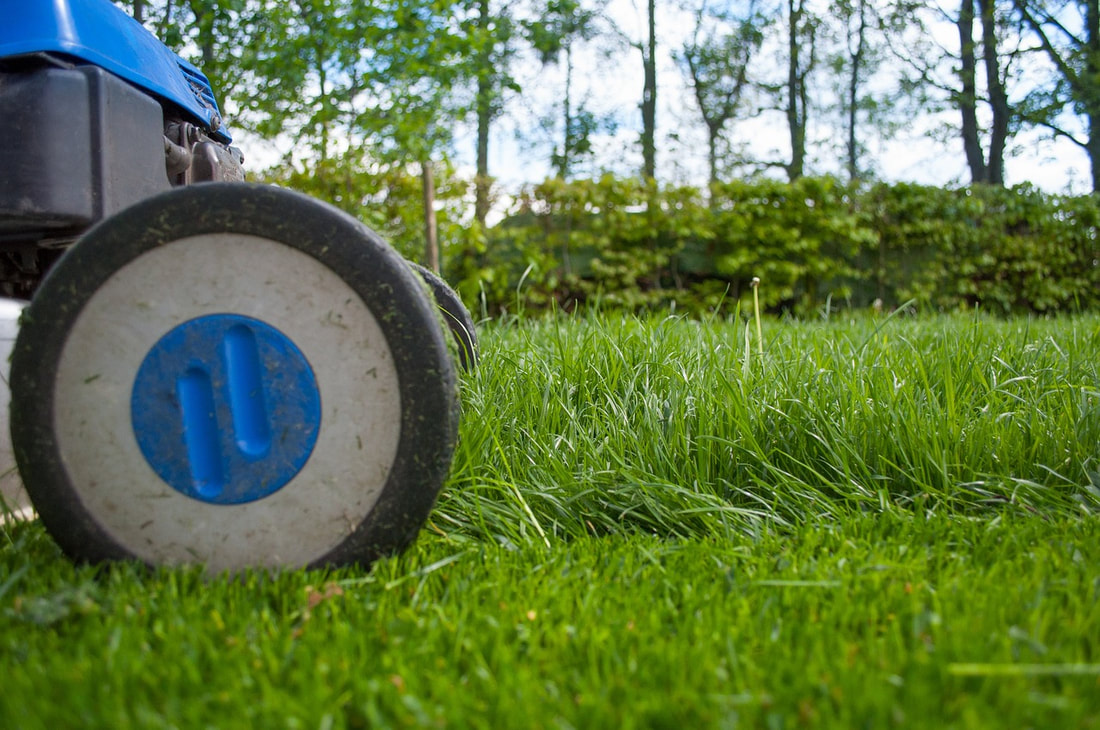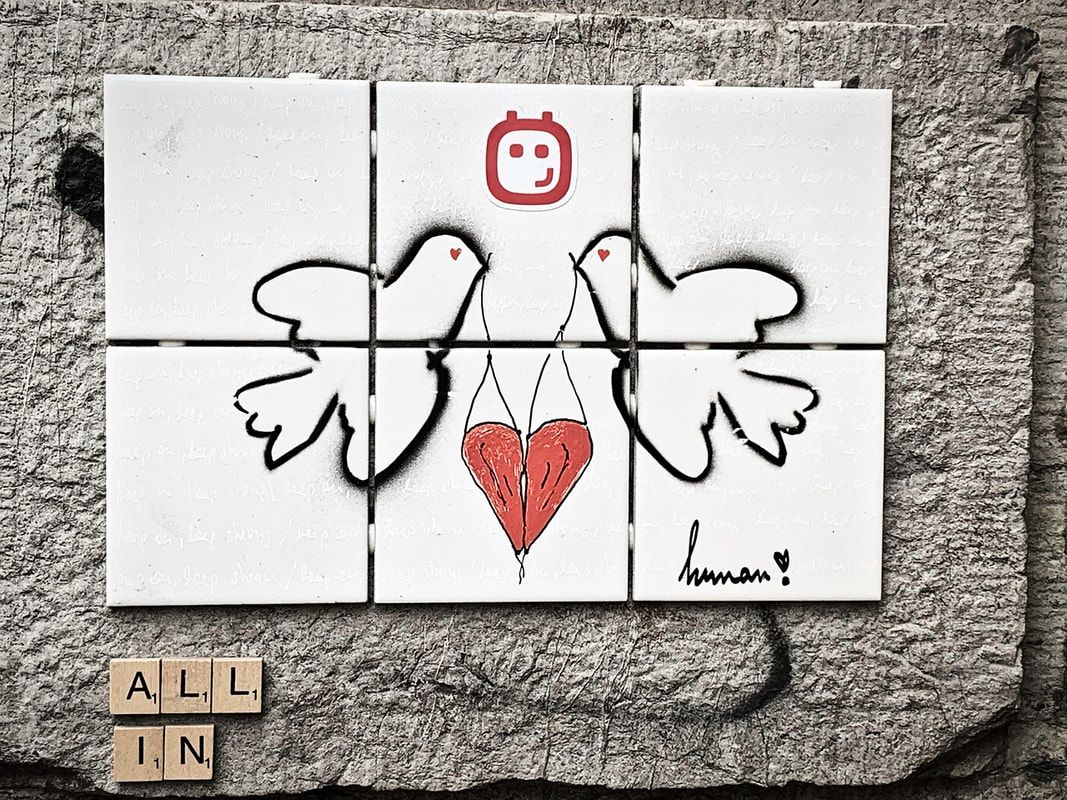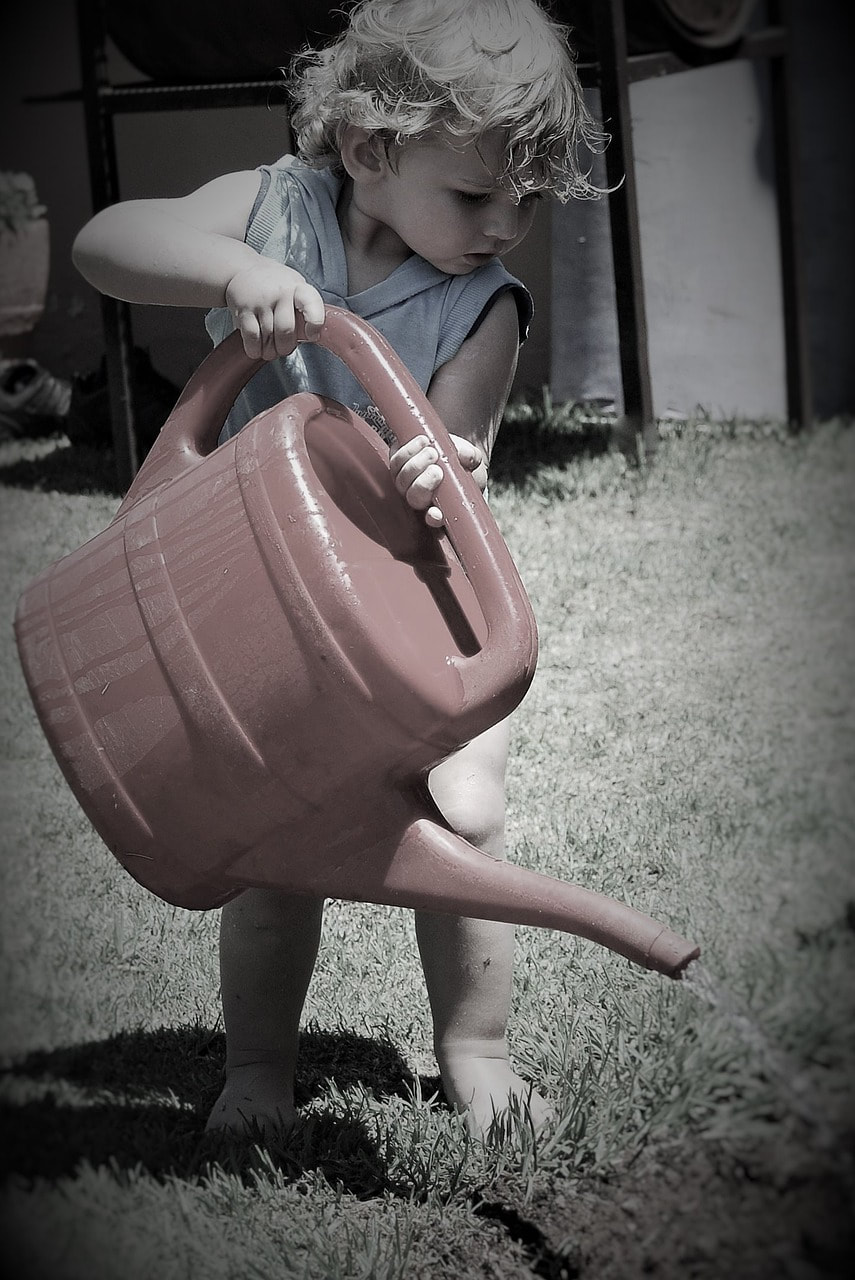 Image by Rudy and Peter Skitterians from Pixabay I just had to laugh, and ask myself, what is the lesson I can take away from this I went to our back yard garden to sit in my favorite blue Adirondack chair, surrounded by white and yellow daisies and wildflowers my wife has cultivated over the years. I wanted to listen to the birds while meditating. I don’t often do this – go outside to mediate - but this year, we seem to have more birds chirping and singing in our yard than at any other time in the 36 years we’ve lived here. I was looking forward to the joy of having birdsongs guide my way to stillness. I was just beginning to settle into my meditation, when a neighbor from two doors down started up his very loud, gas powered lawnmower. Knowing that my neighbor’s yard is smaller than mine, I figured he would only be mowing for about 20 minutes at the most and that I could find a way to ignore the noise as I tried again to settle into thoughts of peace. Being a Quaker, I’ve learned that seeking the Divine requires quiet and not necessarily silence. Sure enough, in less than 20 minutes the lawnmower stopped. The silence was stark and welcomed, the sound of the birds re-emerged and I found myself smiling. I could once again focus on the bird songs, on the weight of my body on the chair, on my rhythmic breathing as I allowed my thoughts to float past, as if they were leaves in a stream. Whap, Whap, Whap, Whap, Whap – the sound of my neighbor’s weed whacker punctured my reserve. Jesus, I thought to myself, come on! But then I caught my growing agitation and refocused my energy on letting things go. Letting my irritation go. Letting the sound of the motor sink to the background. This letting go was working and shortly, the motor stopped and the silence returned. Thank you – I thought to myself. Even with all the interruptions I was finding some stillness while sitting in our garden. I was pleased that I didn’t allow the noisy lawn care to drive me inside. Suddenly, I was startled by the high pitched whine of a leaf blower the same neighbor was using to blow the grass clippings off his sidewalk and back onto the lawn. At this point, I just had to laugh, and ask myself, what is the lesson I can take away from this comedy of meditative challenges. As I sat there listening to the relentless sound of machine blowing grass and dust into the air I had a sense that even though it was irritatingly loud, the man and the leaf blower were both connected to the universe. I went to my backyard to find the Divine in the sound of the songbirds. Instead, I found the Spirit of God through the intrusive roar of a leaf blower. My meditative thought is that the Spirit is everywhere and cannot be ignored anywhere; that the whine of a lawnmower is just as much the sound of the Divine as is the melody of the songbird.
0 Comments
If the Spirit is active and present within every person, then what is needed is a conversion of heart. Are we spiritual beings having a human experience or are we human beings having a spiritual experience, is the famous question asked by Jesuit priest and philosopher Pierre Teilhard de Chardin. I believe it is the former, that we are spiritual beings at our core. But, taking it one step further, I also believe that everything within the Cosmos has a spiritual foundation; that the spirit of the Divine is woven throughout the universe and that God is the weaver.
If it is true that the Spirit is woven through all things and for all time, then there can be none other than a spiritual solution to any problem. In this context, all problems become spiritual problems. A few years ago, I was having an online conversation with a conservative Christian friend about what the bible says on the matter of the division between church and state. My friend – a bible literalists – was adamant that there is a clear demarcation between church and state, citing the new testament passage of Mark 12: 13-17 where Jesus takes a coin with the likeness of Caesar and announces that all should “give to Caesar what is Caesar’s and to God what is God’s.” The question Jesus answered was about paying taxes. What I believe he was getting at is this: What in the cosmos does not emanate from God? If you are arguing over whether the religious should pay taxes, you are focused on the wrong question. If everything comes from God, what does it matter? Pay the silly taxes to keep yourself out of harm’s way – but don’t lose sight of the fact that everything comes from the Divine. From my perspective, Jesus was saying that everything is spiritually focused; that we actually live in a spiritual world but get lost and confused in our worldly machinations. A Quaker F/friend of mine has spent many an anxious moment pondering what can a person do to raise the consciousness of the general public – and of our leaders and decision makers – about the pending environmental disaster unfolding within our lifetime and most certainly within the lifetime of our children and grandchildren. We Quakers believe there is “that of God” within everyone, and that the voice of the Divine leads and guides each of us. If that is true – and I believe it is – then God is at this very moment whispering to those recalcitrant decision makers that the earth is crying out; that they need to pay attention; that they need to act. Now. If the Spirit is active and present within every person, then what is needed is a conversion of heart. What is needed is a spiritual revival to awaken all to the call of the Divine on climate change; on gun control; on voter repression; on race, on equality, and on all other issues of justice and decency. How do we get there, how do we get to this global conversion of heart? We pray… for ourselves, for those who are or will be impacted by these issues, and for the decision makers – that they will quiet themselves enough to hear the faint whisper of the Divine and act on it. Is prayer enough? No. If prayer were enough, these seemingly intractable issues would be resolved. We must listen to the voice of God within our own heart and act on what we hear. We must become models of a people who are spiritually focused and who believe – whole heartedly – that the answer to all problems is spiritual. After all, we are a spiritual people living in a spiritual world, seeking a spiritual solution. Perhaps renowned spiritual leader Henri Nouwen said it best: “Every time in history that men and women have been able to respond to the events of their world as an occasion to change their hearts, an inexhaustible source of generosity and new life has been opened, offering hope far beyond the limits of human prediction.” We must pray. We must act. We must believe that our prayers and actions will be enough. And then, we must give over everything else to the Divine. There is a lot we can learn from children, if we just open our eyes and our hearts I have the joy of helping to care for our toddler granddaughter every Thursday, and on a recent visit, I was struck by how her words and actions could be translated into solid management techniques. I know what you might be thinking. Many of us have had the unfortunate experience of working for a supervisor who acted like a toddler; who thought only of him/herself or who threw temper tantrums when things didn’t go their way. But that’s not what I’m talking about here. There are positive lessons we all can learn from observing little ones at play. Following are a few examples. Know What You Want and Provide Clear Directions – Any employee who has tried to get a clear directive from a waffling or overtly political manager can appreciate the explicit tone of a toddler. There is no ambiguity about what our granddaughter likes nor in what she wants from adults. “Pop-pop (her name for me), sit here and read the Color book with me.” “You wear the green hat, I want the red one.” “I’m going to hide in the closet, you stay here.” Clear. Simple. Direct. Be Authentic but Don’t Take Yourself Too Seriously – There is nothing more frustrating or disempowering in an organization than a manager that tries to be all things to all people. It is equally important for a good manager to have a sense of humor and to not take themselves too seriously. I’ve worked with managers who put themselves and their career above the good of their employees and the organization causing suspicion a chaos in their wake. That’s not what you get from toddlers who have no guile and who are uniquely comfortable within themselves. Our granddaughter is exactly who she is and spends zero time considering how she may come across to those around her. She will happily place heart and butterfly stickers all over her face and dance around the house feeling all the more special for it. She will make a noise with her mouth and then laugh boisterously over her “joke.” Happy is the organization when a manager can laugh at themselves, acknowledge their mistakes, and move on. Be Kind and Inclusive – A good manager will ensure that everyone is cared for within the organization. Employees will be more loyal to the company and will take more risks if they believe their manager has their back. My granddaughter innately knows this. If we are playing tea party, she makes sure that everyone gets a cup and a cookie. If I’m off in another room and happen to cough, our granddaughter will come running to me to ask “are you OK Pop-pop?” Here’s a real-world story that I wish every manager could emulate. My daughter is a teacher and one day last year her school experienced a “code red,” meaning there was serious trouble in the building. Everything turned out fine, but she was shaken. On her ride home she called me, just to talk. She finished up our conversation saying, “I just want to go home and hug my baby.” My daughter did go home and hug her baby (my granddaughter) who was 15 months old at the time. As she hugged her child, my daughter began to cry. Seeing her mother distraught, our granddaughter took the pacifier out of her mouth and handed it to her mom – knowing intuitively that her mom needed comforting from it more so than she. If a manager showed me that amount of kindness and empathy during a time of turmoil and strife, they would have my undying loyalty. There is a lot we can learn from children, if we just open our eyes and our hearts and get out of our own way. For me, it can all be summed up to this: be honest, be authentic and be kind and everything else will take care of itself. |
AuthorMike Soika has been a community activist for more than 30 years working on issues of social and economic justice. His work for justice is anchored by his spiritual formation first as a Catholic and now as a Quaker. Pre 2018 Archives
|



 RSS Feed
RSS Feed
